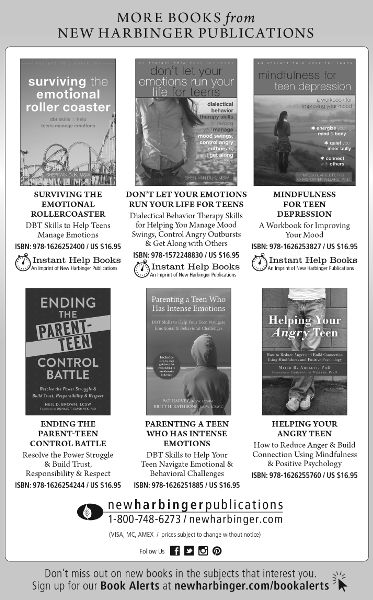References
Aguirre, B., and G. Galen. 2013. Mindfulness for Borderline Personality Disorder: Relieve Your Suffering Using the Core Skill of Dialectical Behavior Therapy. Oakland, CA: New Harbinger Publications.
Centers for Disease Control and Prevention. 2015. “Suicide Facts at a Glance.” Web-based Injury Statistics Query and Reporting System (WISQARS). (2013, 2011) National Center for Injury Prevention and Control, CDC (producer). Accessed December 1, 2016. Available from http://www.cdc.gov/injury/wisqars/index.html.
Ciarrochi, J., A. Bailey, and R. Harris. 2014. The Weight Escape: How to Stop Dieting and Start Living. Boulder, CO: Shambhala Publications.
Eifert, G. H., M. McKay, and J. P. Forsyth. 2006. ACT on Life Not on Anger: The New Acceptance and Commitment Therapy Guide to Problem Anger. Oakland, CA: New Harbinger Publications.
Gilbert, P. 2010. The Compassionate Mind: A New Approach to Life’s Challenges. Oakland, CA: New Harbinger Publications.
Goleman, D. 1995. Emotional Intelligence: Why It Can Matter More Than IQ. New York: Bantam Books.
Gottman, J., and N. Silver. 1999. The Seven Principles for Making Marriage Work. New York: Harmony Books.
Harris, R. 2009. ACT Made Simple. Oakland, CA: New Harbinger Publications.
Hayes, S. C. 2016. “State of the ACT Evidence.” Association for Contextual Behavioral Science. Accessed December 1. https://contextualscience.org/state_of_the_act_evidence.
Hayes, S. C., D. Barnes-Holmes, and B. Roche, eds. 2001. Relational Frame Theory: A Post-Skinnerian Account of Human Language and Cognition. New York: Plenum Press.
Hayes, S. C., K. D. Strosahl, and K. G. Wilson. 1999. Acceptance and Commitment Therapy: An Experiential Approach to Behavior Change. New York: Guilford Press.
———. 2012. Acceptance and Commitment Therapy: The Process and Practice of Mindful Change. 2nd ed. New York: Guilford Press.
Hayes, S. C., K. D. Strosahl, K. G. Wilson, R. T. Bissett, J. Pistorello, D. Toarmino, M. Polusny, T. A. Dykstra, S. V. Batten, J. Bergan, S. H. Stewart, M. J. Zvolensky, G. H. Eifert, F. W. Bond, J. P. Forsyth, M. Karekla, and S. M. McCurry. 2004. “Measuring Experiential Avoidance: A Preliminary Test of a Working Model.” The Psychological Record 54 (4): 553–78.
Kabat-Zinn, Jon. 1990. Full Catastrophe Living: Using the Wisdom of Your Body and Mind to Face Stress, Pain, and Illness. New York: Delacorte Press.
———. 2005. Wherever You Go, There You Are. 10th ed. New York: Hachette Books.
Mansfield, A. K., M. Addis, and J. R. Mahalik. 2003. “‘Why Won’t He Go to the Doctor?’: The Psychology of Men’s Help Seeking.” International Journal of Men’s Health. 2 (2): 93–109.
McKay, M., M. Davis, and P. Fanning. 2009. Messages: The Communication Skills Book. 3rd ed. Oakland, CA: New Harbinger Publications.
Patterson, G., and M. Forgatch 2005. Parents and Adolescents Living Together Part 1: The Basics. 2nd ed. Champaign, IL: Research Press.
Ross, S., and N. L. Heath. 2002. “A Study of the Frequency of Self-Mutilation in a Community Sample of Adolescents.” Journal of Youth and Adolescence 31 (1): 67–77.
Siegel, D. J. 1999. The Developing Mind: Toward a Neurobiology of Interpersonal Experience. New York: Guilford Press.
Strosahl, K., P. Robinson, and T. Gustavsson. 2012. Brief Interventions for Radical Change: Principles and Practice of Focused Acceptance and Commitment Therapy. Oakland, CA: New Harbinger Publications.
Tavris, C. 1989. Anger: The Misunderstood Emotion. Rev. ed. New York: Simon and Schuster.
Thompson, M. 2011. “Why Do So Many Boys Not Care About School?” PBS Parents. February 6. http://www.pbs.org/parents/experts/archive/2011/01/why-so-many-boys-dont-care-abo.html.
Tirch, D., B. Schoendorff, and L. R. Silberstein. 2014. The ACT Practitioner’s Guide to the Science of Compassion: Tools for Fostering Psychological Flexibility. Oakland, CA: New Harbinger Publications.
Wilson, K. 2008. Mindfulness for Two: An Acceptance and Commitment Therapy Approach to Mindfulness in Psychotherapy. Oakland, CA: New Harbinger Publications.
Wilson, K., and T. Dufrene. 2010. Things Might Go Terribly, Horribly Wrong: A Guide to Life Liberated from Anxiety. Oakland, CA: New Harbinger Publications.
Patricia E. Zurita Ona, PsyD, is director of the East Bay Behavior Therapy Center and adjunct professor at the Wright Institute. Her clinical work started first as school psychologist, and then as a clinical psychologist. She has significant experience working with children, adolescents, and adults with mood, anxiety, and body-image concerns; particular areas of expertise are obsessive-compulsive disorder (OCD) and post-traumatic stress disorder (PTSD). Zurita Ona also provides specialized services for individuals struggling with emotional dysregulation problems, such as borderline personality disorder (BPD), with or without self-harm and suicidal behaviors. She is coauthor of Mind and Emotions, a universal protocol for emotional disorders that has received a “Self-Help Seal of Merit” from the Association for Behavioral and Cognitive Therapies (ABCT).
Foreword writer Kirk D. Strosahl, PhD, is cofounder of acceptance and commitment therapy (ACT), a cognitive behavioral approach that has gained widespread adoption in the mental health and substance-abuse communities. He is coauthor of Brief Interventions for Radical Change and In This Moment. Strosahl provides training and consultation services for Mountainview Consulting Group, Inc. He is a pioneer in the movement to bring behavioral health services into primary care. He resides in Portland, OR.
Afterword writer Matthew McKay, PhD, is a professor at the Wright Institute in Berkeley, CA. He has authored and coauthored numerous books, including The Relaxation and Stress Reduction Workbook, Self-Esteem, Thoughts and Feelings, When Anger Hurts, and ACT on Life Not on Anger. McKay received his PhD in clinical psychology from the California School of Professional Psychology, and specializes in the cognitive behavioral treatment of anxiety and depression. He lives and works in the greater San Francisco Bay Area.
